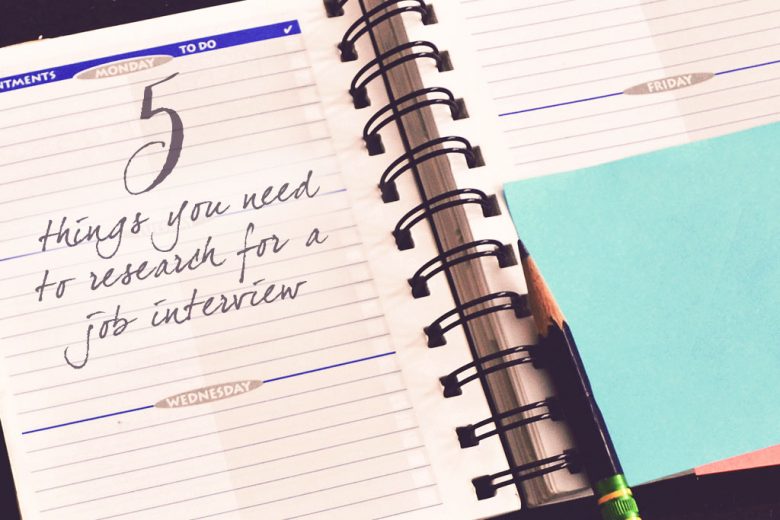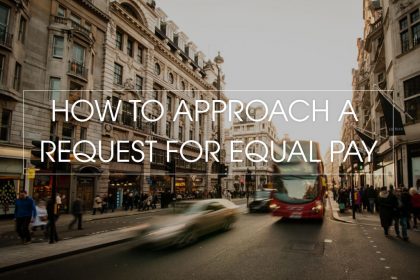Five things you need to research for a job interview
So you’ve written the perfect CV, sent an exceptionally well-written application letter, and landed an interview for your ideal position. Now you need to do some brilliant detective work on your potential future employer.
There’s plenty to prepare for a job interview – you need to find an appropriate outfit, research your route to the location, and (maybe most importantly) ensure you’re well armed with plenty of research.
But what information exactly should you research, and how and where do you find it?
Five things you need to research for a job interview
To help ensure you make the right impression at your interview, we reveal five pieces of information you need to research – and where you can find them.
1) The company’s unique strengths
Every company has a USP – the one strength or quality that sets them apart from their competition. And luckily, it’s usually quite easy to find on their website.
To find out what the company you’re interviewing with thinks makes them special, simply go to their ‘About us’ page. Some companies will include this information in the general copy on the page, while others write it into their mission or values. But somewhere or other, it should be there.
While you’re seeking out their USP, it’s worth making a note of other details about the company too – such as size, locations, number of staff and anything they think important enough to highlight in the description of their organisation.
Once you’ve learned this information, you can use it to:
- Drop into conversation during your interview (if a natural opportunity arises).
- Inform your answers and the description of your own work strengths (for example, if great customer service is mentioned, you can highlight your own customer service skills).
- Ensure you don’t look awkwardly blank if they ask you what you know about their company.
- Prepare intelligent questions that demonstrate your knowledge.
It may seem the most basic level of research, but you’d be surprised how many interviewees don’t bother to do it. And could possibly help set you apart from other candidates who come across and less informed and, as a result, less keen.
Applying for a job? How to write the perfect application letter or email.
2) Any new company developments
As well as researching a company’s unique strengths, keeping abreast of their latest news can help to give you the edge in an interview. It will enable you to give more informed, relevant responses to questions, and to prepare more impressive questions of your own.
And luckily for you, we’re spoiled for opportunities to keep up to date on a company’s latest news and developments today – most organisations are only too keen to share updates in blogs and across their social media channels.
To find out what’s happening in the company you want to work for you can:
- Google them in news stories.
- Read their company blog.
- Check their social media sites.
- Search trade magazines and blogs.
Does your CV keep getting ignored? Read six expert HR tips to get it noticed!
3) The company’s culture
A job interview isn’t just an employer’s opportunity to see whether you’re the type of person they want to hire – it’s your chance to check that this really is the right role (and company) for you.
So use this time before your interview to make sure that the organisation is the kind of place you want to work – and if you do have any questions or doubts, you can raise them in your interview.
But what should you look out for? Here are a few thoughts to get you started:
- Is the company friendly?
- Does it have a good reputation?
- Are their employees happy?
- Does it share the same values as you?
- What’s their position on flexible working?
Once again, social media can give you a good indication of a company’s culture. Take a look at the way their profiles are written. Are they friendly and open, or corporate and cold? And how does the company interact with customers online? Do they respond to queries and complaints? It can give you an insight into how much they care.
And what about their ethics as a business? Does their website have a Corporate Social Responsibility (CSR) page? What do their mission and values pages convey? And what can you learn about their flexible working policies?
If you know the names of the people interviewing you, or your potential managers and colleagues, try to find their profiles on LinkedIn too – what can you learn about them on there? (Take a look at the company’s LinkedIn page too.)
But maybe the only real way you can find out what they’re like as an employer is to speak to someone who currently works there or has recently left. So if you have any contacts from the company, ask them.
Are you making these six common CV mistakes?
4) The industry and competition
As well as becoming an instant expert in the company you’re interviewing with, it’s a really good idea to learn as much as you can about the industry or market they’re in as a whole – and their competition.
To find out what companies are similar to them, look at their LinkedIn company page and scroll down to the ‘Other Companies People Viewed’ section – you should see a few competitors there. Check out their pages and then look at their ‘Other Companies People Viewed’ section, too. You’ll soon start to see the same few names crop up.
Once you have a list of companies, take a look at their About Us pages, and research their latest news. Look for any big developments that may impact or reflect the industry as a whole, or specifically the company you’re interviewing with.
It may seem a lot of work for one interview, but the more informed you are, the easier you’ll find it to answer interview questions, look knowledgeable and sound enthusiastic – and it could be the clincher that just swings a decision your way.
How to make your CV look better – our advice!
5) Yourself!
Now this may sound a bit strange, but bear with us. Just as you’re frantically gathering every useful bit of knowledge you can about the company you want to work for, there’s a very good chance they’re doing exactly the same to you.
This means that, in your interview, you need to be prepared to answer questions about your background, work experience, industry profile and even social media activities.
So if you don’t want to be left embarrassingly struggling to recall something you have said or done in the past, make sure you know exactly what trail you have left online. And this means:
- Googling yourself.
- Re-reading any old blogs you may have long-forgotten.
- Checking any public social media profiles.
- Checking what your LinkedIn profile says.
- Looking for any old news stories about you.
- Searching through previous employers’ websites for mentions of you.
Hopefully all your findings will be positive, and you’ll just need to refresh yourself on what you have done and said over the years. But if there is anything embarrassing or negative, you’ll have plenty of opportunity to prepare a good response in case you’re asked about it in your interview.
Use your knowledge wisely
With knowledge comes power – but only when your knowledge is used wisely. So make sure that you use the information and insights you learn effectively in your job interview, and show your potential employer that you’re the perfect candidate for the job.










